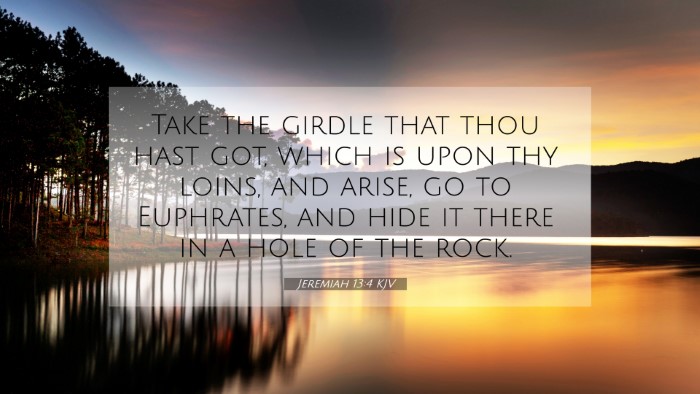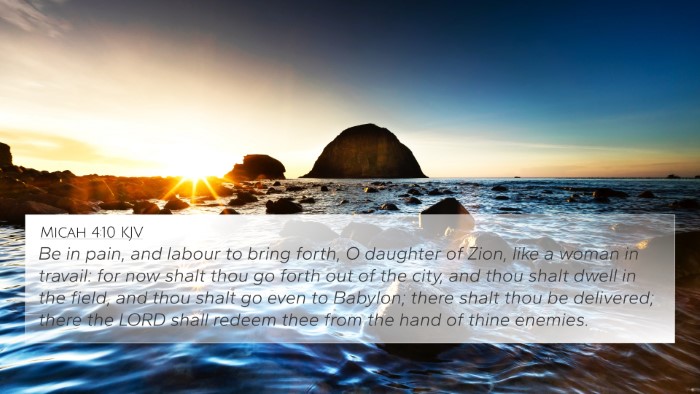Understanding Jeremiah 13:4
Jeremiah 13:4 states, "Take the girdle that thou hast bound upon thy loins, and arise, go to the Euphrates, and hide it there in a hole of the rock." This verse is rich in symbolism and prophetic meaning, illustrating the Lord's message to Israel about their pride and impending judgment. By considering the insights from various public domain commentaries, we can explore its depth and implications.
Context and Background
The Book of Jeremiah primarily serves as a warning to the people of Judah regarding their behavior and disobedience. In the context of Jeremiah 13, God sends Jeremiah to demonstrate the fate of Judah through symbolic actions. The girdle (or loincloth) represents the pride and arrogance of the people which would ultimately lead to their ruin.
Symbolism of the Girdle
According to Matthew Henry, the girdle symbolizes the close relationship between God and His people. Just as a girdle is meant to be worn and close to the body, so too was Israel meant to be close to God. The act of burying the girdle illustrates the reality of separation and loss that would follow their disobedience.
Albert Barnes adds that the girdle’s hiding signifies that God’s favor would be hidden from them, emphasizing their spiritual decay and the coming judgment. This imagery vividly portrays the abandonment that Israel would experience due to their unfaithfulness.
Interpreting God’s Message
The verse's directive to bury the girdle also carries prophetic significance. Adam Clarke explains that this action prefigures the ultimate decay and destruction of Judah. As the girdle is rendered useless when hidden, so is Israel when they turn away from God.
Cross-References
Jeremiah 13:4 can be connected to several other Bible verses that highlight similar themes:
- Isaiah 47:2 - "Take the millstones, and grind meal: uncover thy locks, make bare the leg, uncover the thigh, pass over the rivers." The imagery of exposure signifies judgment against the proud.
- Ezekiel 5:1 - "And thou, son of man, take thee a sharp knife, take thee a barber's razor, and cause it to pass upon thy head and upon thy beard." This prophetic act of cutting hair symbolizes the severing of relationships.
- Hosea 1:2 - "The beginning of the word of the Lord by Hosea. And the Lord said to Hosea, Go, take unto thee a wife of whoredoms and children of whoredoms: for the land hath committed great whoredom, departing from the Lord." God often used marriage as a metaphor for His relationship with Israel.
- Proverbs 16:18 - "Pride goeth before destruction, and a haughty spirit before a fall." The connection between pride and downfall is consistent throughout scripture.
- Matthew 23:12 - "And whosoever shall exalt himself shall be abased; and he that shall humble himself shall be exalted." This New Testament verse captures the essence of humility versus pride.
- James 4:6 - "But he giveth more grace. Wherefore he saith, God resisteth the proud, but giveth grace unto the humble." God's resistance towards pride recurs as a theme.
- Romans 11:20 - "Well; because of unbelief they were broken off, and thou standest by faith. Be not highminded, but fear." This reinforces the need for faith over pride.
Thematic Connections
The theme of pride leading to judgment resonates throughout the Bible. The actions of Jeremiah in this verse create a dialogue with the teachings of both the Old and New Testaments, facilitating a deeper understanding of God’s relationship with humanity.
By cross-referencing different biblical passages, we discover how themes such as humility, judgment, and grace are universally applicable and relevant throughout scripture.
Tools for Cross-Referencing
Understanding cross-references can enhance one’s study of scripture effectively. Here are some tools and methods for Bible cross-referencing:
- Using a Bible concordance to locate similar themes and words.
- Consulting a Bible cross-reference guide that outlines connections between verses.
- Employing a comprehensive Bible reference resource that provides in-depth studies of themes.
- Engaging in cross-reference Bible study to examine parallels in multiple scriptures.
Conclusion
Jeremiah 13:4 serves not only as a warning to the people of that time but also as a timeless message about the dangers of pride and the necessity of remaining close to God. Through cross-referencing various scriptures, one can appreciate the interconnectedness of biblical texts and the overarching themes that unify them, illuminating God's enduring call to faithfulness and humility.





